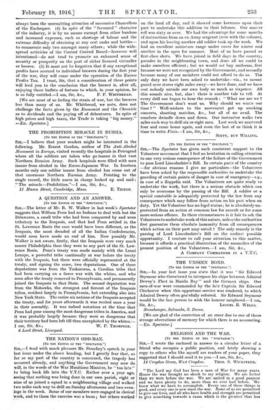A QUESTION AND AN ANSWER.
[TO THE EDITOR OF THE " SPECTATOR."] SIR,—The letter of Mr. R. W. Walker in last week's Spectator suggests that William Penn had no Indians to deal with but the Delawares, a small tribe who had been conquered by and were tributary to the Iroquois, and that had Penn settled in the St. Lawrence Basin the enaa would have been different, as the Iroquois, the most dreaded of all the Indian Confederacies, would soon have made an end of him. Now possibly Mr. Walker is not aware, firstly, that the Iroquois were very much nearer Philadelphia than they were to any part of the St. Law- rence Basin. Penn's treaty was made mainly with the Lenni Lenape, a powerful tribe continually at war before the treaty with the Iroquois, but there were officially represented at the treaty, and signing the same, two deputations. One of these deputations was from the Tuskaroras, a Carolina tribe that had been carrying on a fierce war with the whites, and who soon after the treaty removed to Pennsylvania, and permanently joined the Iroquois in that State. The second deputation was from the Mohawks, the strongest and fiercest of the Iroquois tribes, resident largely in Pennsylvania, but extending also into New York State. The entire six nations of the Iroquois accepted the treaty, and for years afterwards it was recited once a year in their assembly. It was indeed notorious at the time that Penn had gone among the most dangerous tribes in America, and it was probably largely because they were so dangerous that their territory had been left till then unexploited by the whites.=


































 Previous page
Previous page